Brexit: Commons set for knife-edge votes on deal
- Published
- comments
Boris Johnson on "deal that can heal the rift in British politics"
MPs have been debating the PM's Brexit deal, amid uncertainty about whether the decisive vote on it will go ahead.
The PM is trying to convince MPs to support the agreement he secured with the EU, in Parliament's first Saturday session in 37 years.
Mr Johnson told MPs "now is the time to get this thing done", saying any delay beyond 31 October would be "corrosive".
MPs are now voting on a proposal that could delay the Brexit deal until all the necessary UK legislation is passed.
Commons Speaker John Bercow has chosen an amendment that, if passed, would require the PM to write to the EU by the end of the day to ask for a three-month extension to Brexit.
Downing Street has threatened to postpone the vote on the revised deal altogether if MPs vote for a Brexit delay.
If that happens, ministers are likely to press on by introducing legislation to Parliament needed to ratify the agreement on Monday. A vote on that proposed bill might then be held on Tuesday.
If the vote on the deal goes ahead, it is expected to be incredibly close, with the PM's former DUP allies, the Lib Dems and the SNP planning to vote against but many Tory Brexiteers who opposed Theresa May's agreement - known as the Spartans - now on board.
Labour leader Jeremy Corbyn said his party would "not be duped" into voting for an agreement which would leave the UK worse off.
However, at least nine Labour MPs are expected to support the government while the PM is hoping to be backed by some of the 21 Tory MPs he sacked for opposing him last month.
Mr Johnson has repeatedly said Brexit will happen by the end of the month with or without a deal.
As the first weekend sitting since the invasion of the Falklands in 1982 got underway, he defended the terms of of his revised EU withdrawal agreement.
'Heal rifts'
He urged MPs to come together to begin to "heal the rifts in British politics", saying he believed a majority of MPs were committed to delivering the result of the 2016 referendum.
He suggested any further negotiations would be fruitless and urged opponents of Brexit to "abandon their delusion" that another delay would help the UK.
Jeremy Corbyn said the prime minister's Brexit deal was "a sell-out"
"It is my judgement we have reached the best possible solution," he said.
"I must tell the House, in all candour, whatever letters they may seek to force the government to write, it cannot change my judgement that further delay is pointless, expensive and deeply corrosive of public trust."
After several hours of debate, there will be series of votes, not expected before 14.30 BST.
Allow X content?
This article contains content provided by X. We ask for your permission before anything is loaded, as they may be using cookies and other technologies. You may want to read X’s cookie policy, external and privacy policy, external before accepting. To view this content choose ‘accept and continue’.
Allow X content?
This article contains content provided by X. We ask for your permission before anything is loaded, as they may be using cookies and other technologies. You may want to read X’s cookie policy, external and privacy policy, external before accepting. To view this content choose ‘accept and continue’.

The first amendment to be voted on is a controversial proposal put down by former Tory Sir Oliver Letwin, who now sits as an independent.
This would withhold parliamentary support for the deal unless and until legislation implementing the agreement in UK law is passed by MPs.
If it is passed, it could force the prime minister to seek a further delay to Brexit beyond the 31 October deadline - under the terms of the Benn Act passed last month.
The BBC's political editor Laura Kuenssberg said its "brutal effect" would be to deny the PM the opportunity of having the "conclusive" vote on his deal he so badly wants.
A No 10 source has said the vote on Mr Johnson's deal will be abandoned if the amendment is passed, saying it will "render the entire day meaningless".
"A vote for Letwin is a vote for delay and the whips will send everyone home," they said. "It would perfectly sum up this broken Parliament."
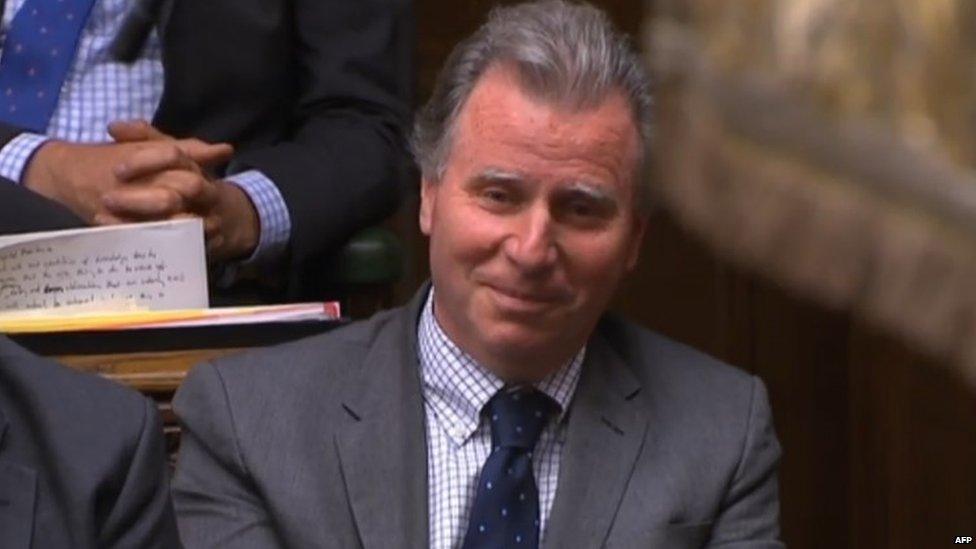
The ex-Tory Sir Oliver Letwin is at the centre of proceedings in Parliament
Sir Oliver told MPs that his amendment was an "insurance policy" to stop the UK "crashing out automatically" of the EU on 31 October if the necessary legislation is not passed in time.
While he would back the Withdrawal Agreement Bill at every stage, he suggested the votes would be "very close" and the PM may not be able to keep "waverers" on board.
He said his intervention would ensure the UK sought an extension which could be used to prevent a no-deal Brexit.
Ministers have appealed to Sir Oliver to think again while Steve Baker, the chairman of the European Research Group of Tory Brexiteers, has given a commitment that it will not seek to derail the agreement as it is scrutinised by MPs.
"What I've been saying to Oliver Letwin and others is that we've played a straight bat, we will vote for all of the legislation," he told the BBC.
Crucial to Mr Johnson's hopes of success will be the Tories who had the whip withdrawn for supporting a bill to force the PM to seek an extension to avoid a no-deal Brexit.
One of those, Alistair Burt, said he would not support the Letwin amendment as his intention all along had been to help facilitate a deal and it was time for MPs to have their say on it.
"I am grateful to the prime minister for having succeeded in that objective and having succeeded in that, I want a vote on that tonight."
And Labour MP Caroline Flint, who is expected to back the PM's deal, said the amendment was a "panic measure" by those who wanted to "delay and stop" the UK leaving.
Former Prime Minister Theresa May - who saw her version of a Brexit deal repeatedly rejected by MPs - urged them to get behind Mr Johnson's agreement, saying: "If you don't want no-deal, you have to vote for a deal."
'Sell-out'
The PM's deal, secured at a Brussels summit on Thursday, ditches Mrs May's backstop clause, the measure designed to prevent a return to physical checks on the Irish border.
Instead it will, in effect, draw a new customs border along the Irish Sea.
The vast majority of Labour MPs will oppose the deal, which Jeremy Corbyn has branded a "sell-out" and worse than Theresa May's agreement rejected three times by MPs.
The government has moved to allay concerns expressed by some Labour MPs by offering them an enhanced role in determining the UK's future relationship with the EU and by announcing workers' rights and environmental standards will be boosted post-Brexit.
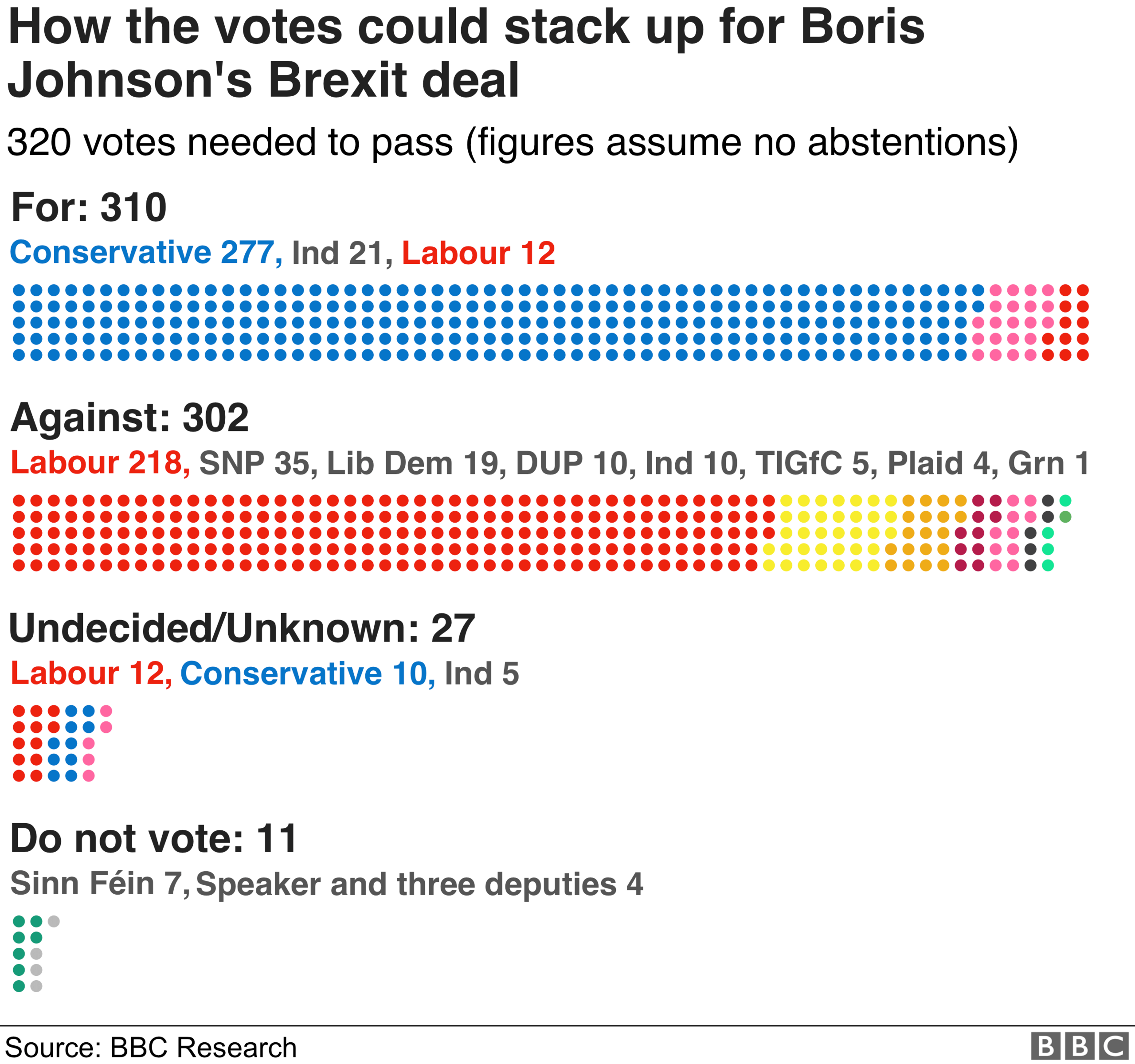

In response to a question from ex-business secretary Greg Clark, Mr Johnson said UK workers would not be short-changed after Brexit and he was prepared to guarantee in law that their rights would not lag behind those on the continent.
But Mr Corbyn said these were "empty promises".
"This government cannot be trusted and these benches will not be duped," he said.
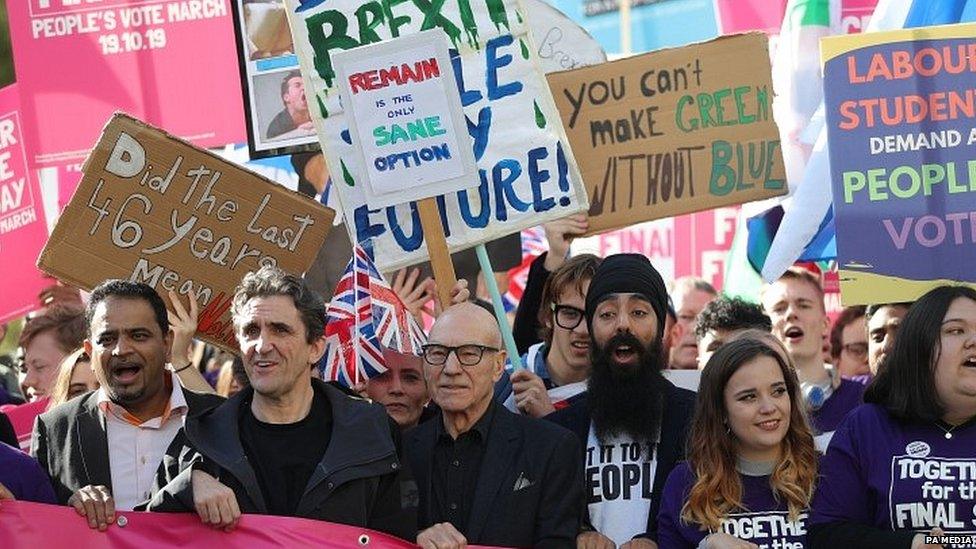
Supporters of another referendum on Brexit have gathered in London
Northern Ireland's Democratic Unionists have made clear they will not be voting for the deal, saying it would "drive a coach and horses" through the power-sharing arrangements enshrined in the Good Friday Agreement.
The party's Westminster leader Nigel Dodds said "weariness" over the Brexit process "should not be an excuse for weakness on the union".
"There may be special circumstances for Northern Ireland but that can only be with consent of the people - unionists and nationalists together. He must respect that."
And the SNP's Ian Blackford said it would not support an agreement which would see Scotland "shafted" economically.
As the debate goes on, thousands of people are expected in central London, to call for a so-called People's Vote, asking for a new referendum on the Brexit deal.
- Published18 October 2019
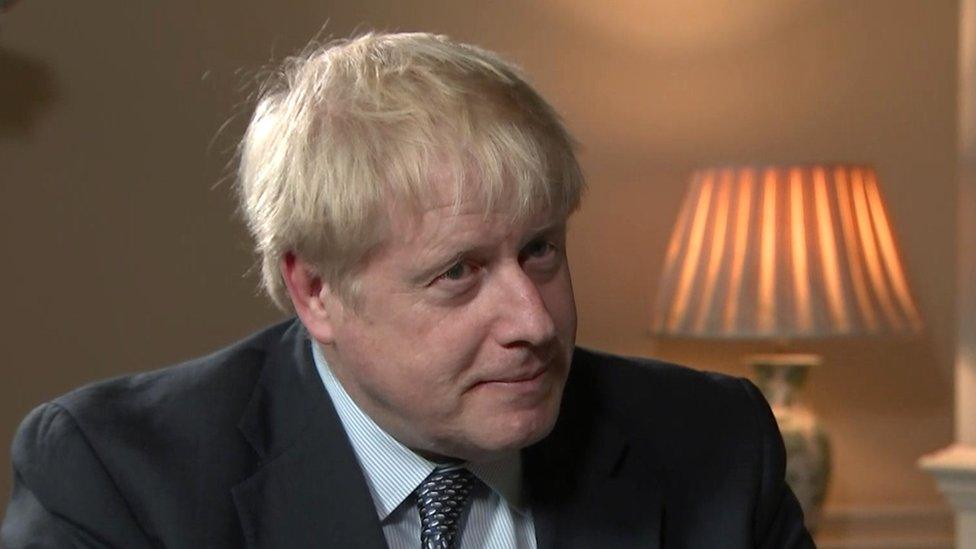
- Published19 October 2019
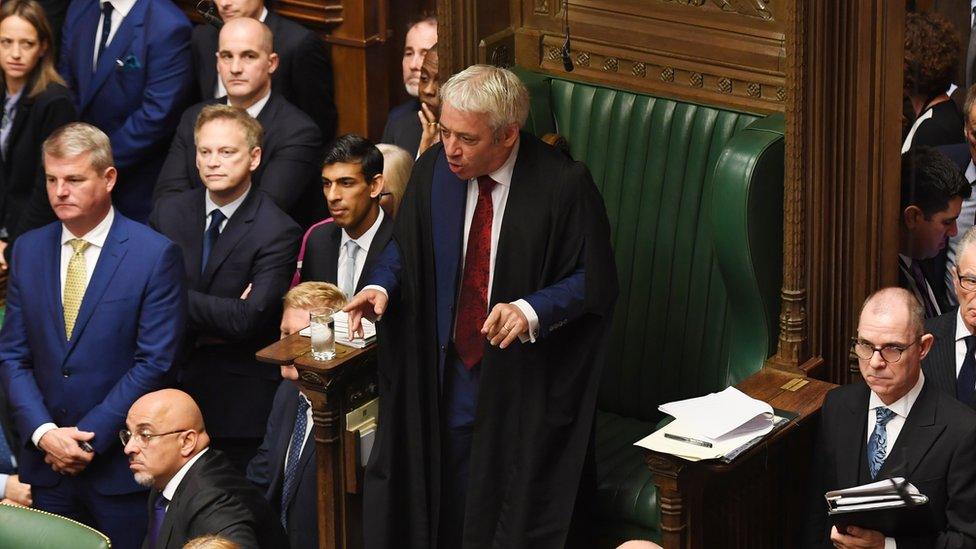
- Published19 October 2019
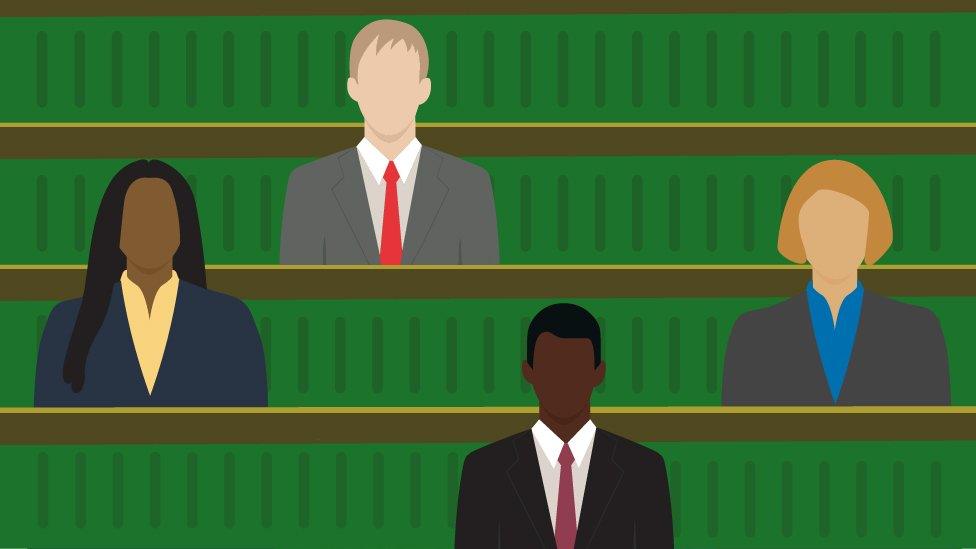
- Published18 October 2019
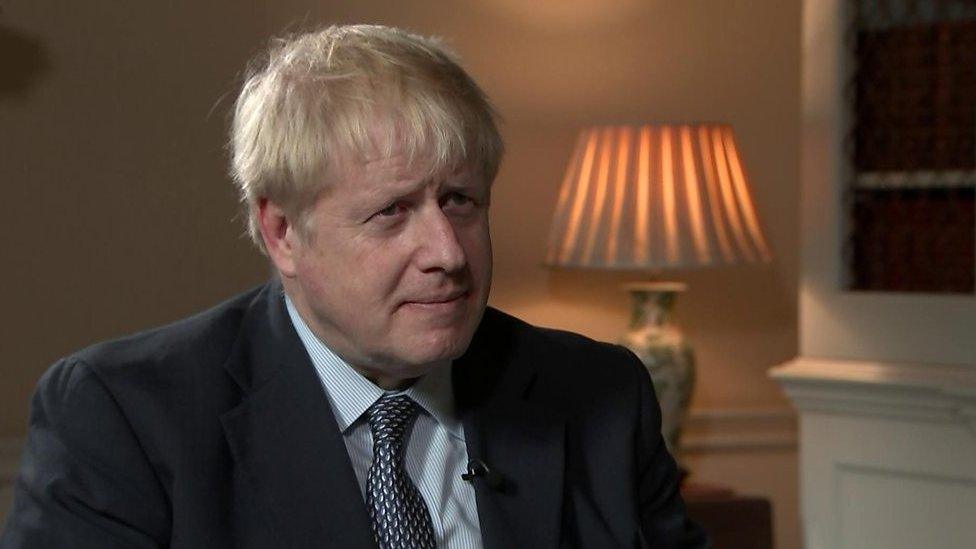
- Published21 October 2019
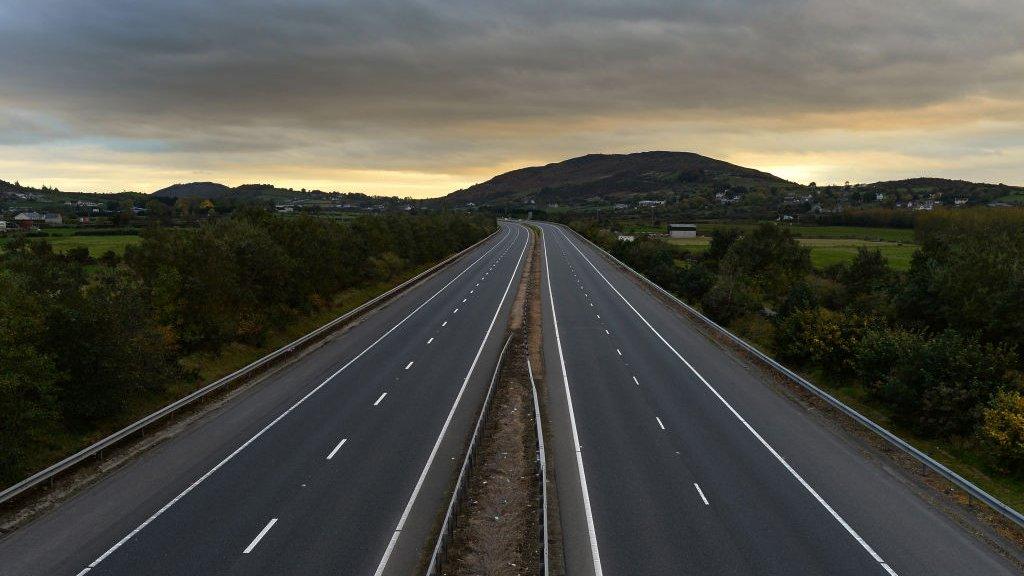
- Published19 October 2019